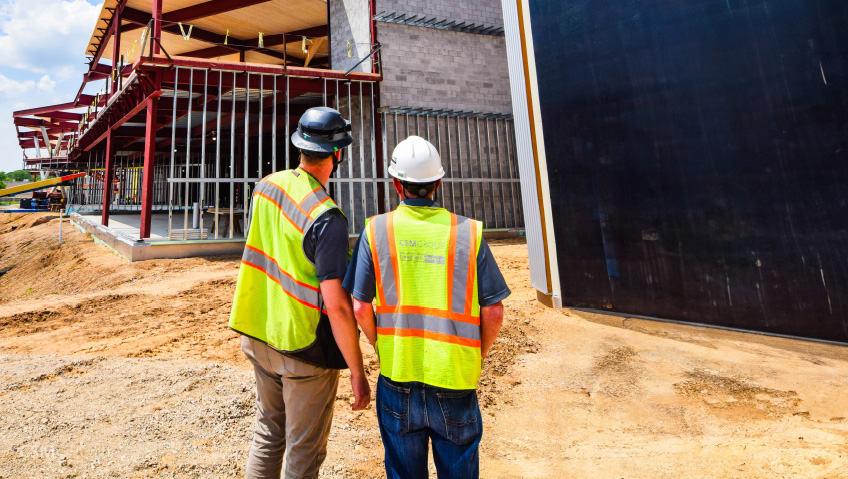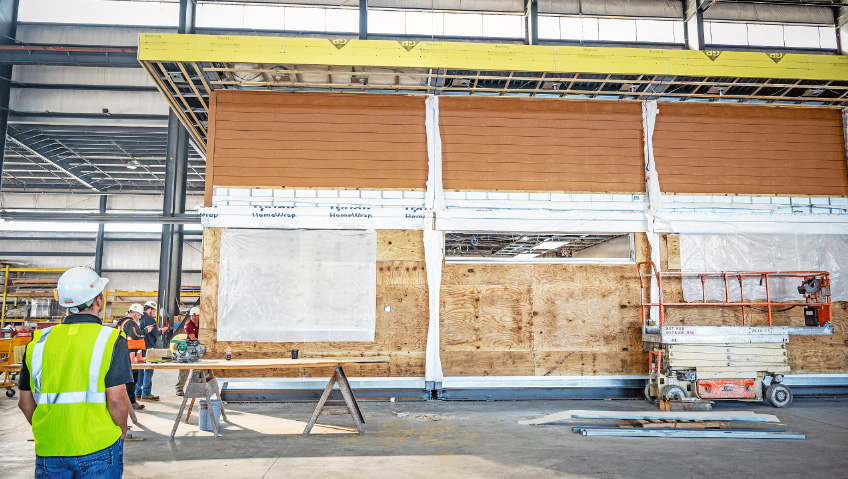For more than 40 years, the CSM Group of Kalamazoo, Michigan has delivered industry-leading projects for Fortune 100 and 500 clients in 35 U.S. states and Canada, in the food and beverage, health care, manufacturing, and pharmaceutical industries, as well as education and commercial projects in local markets.
CSM’s strength is its ability to match a delivery model to specific project needs, including work completed within FDA-regulated environments and occupied environments such as hospitals and schools. The company provides tailored solutions to its clients, including At-Risk and Design-Build project management and services such as project planning and estimating, building information modeling, and safety management.
Stuart Mason, CSM Group’s CEO, believes that safety management is where building stories of success begins, and welcomes an opportunity to speak with us about the company’s Safety and Leadership Program.
Leading with safety
“Leading with safety is one of our core values,” Mason says, noting that CSM Group has been awarded the Safety Award of Excellence by the Western Michigan Chapter of ABC (Associated Builders and Contractors) for 2023 and 2024, only the second time in a decade that the same company has won it two years consecutively.
It was undoubtedly a proud moment for the CSM Group—but not enough, says Mason. “It’s great to be recognized in Western Michigan, but we want to be recognized globally for safety. Our goal is not to be the most profitable company or work with the coolest clients—although we’d like that too—but our goal as an organization is the audacious goal of being the safest company on the planet.”
CSM’s stellar Safety and Leadership program is founded on a sound understanding of behavioral science, which is shared with all employees.
Katrina Reed, Director of Marketing and Sales, tells us that in 2006, CSM Group partnered with Dr. John Austin, who at the time was a psychology professor at Western Michigan University. Company management discussed with him the patterns and trends in behavior that had been observed, and combined with data collected from the construction industry, he pinpointed those components that drive human behavior, relating it to the industry.
According to Dr. Austin’s insights, three things affect human behavior and two of them cannot be changed: people cannot change their DNA, they cannot change the past, but they can change their environment, and changing it leads to better and safer outcomes.
“This approach to behavior is what we teach to our colleagues with the goal of helping them understand the science behind it,” Mason explains. “Before they can create the right environment to get the right behaviors, they have to understand the basic premise: if you create an unsafe environment, you get unsafe behavior and the reverse is true—a safe environment leads to safe behaviors.”
CSM has continued working with Dr. Austin. Several times a year, the company brings him in so he can work with 10 or 12 individuals at all levels throughout the organization, from execution to support staff, to help them identify behaviors, understand why they are happening, and how to change the environment to support desired outcomes.
Underpinning this is the premise that it is important to look at the whole person, because there are many factors that employees may bring to work with them, such as family or relationship stress or medical issues, which influence how they respond to day-to-day tasks. This requires an organization to maintain an open environment where employees can speak freely and ask for help if they need it.
“We talk about psychological safety as well as physical safety, an environment where everyone can speak up and talk about difficult things. It is not easy to build up psychological safety and trust, but when you do, it is transformational, and that is what underpins our culture here,” Mason says.
While the safety and leadership training that the project managers, construction superintendents, engineers, and interns receive at CSM Group is excellent, it has not, in the past, extended to the trades partners and the subcontractors who perform the work, and therein lies a problem.
As Mason notes, the construction industry presents inherent dangers, both physical and psychological. It is work performed outside, often in harsh environments, and for long hours. It’s a male-dominated industry wherein some tradespeople may be reluctant to reach out for help. Compounding that is that tradespeople often work far from their homes, so they are isolated from their families for extended periods.
“It’s a recipe for disaster, and the industry got a wake-up call when the number of construction workers who commit suicide was released. It was staggering compared to other industries, and we must create awareness and an environment where people are comfortable talking about their feelings, where that’s not seen as a weakness or a threat to their job.”
Adds Reed, “Construction workers are 12 times more likely to die by suicide than they are by workplace hazards, such as falls or electrocution, and that is a significant number of individuals who didn’t have an environment of care that was open to them.”
In addition, Mason says, conditions within the industry are combining to create a perfect storm. The industry is the busiest it has been in a long time, with federal government investing in infrastructure and with the resurgence of manufacturing. “Everywhere you turn, you see construction, but at the same time, we have an aging workforce, and we are not getting an inflow of talent, so trades who remain are suffering from general fatigue, not eating properly or exercising, because they feel they don’t have time.”
Partnering with MIOSHA
With this alarming reality in mind, CSM Group is partnering with MIOSHA, the Michigan state agency that regulates workplace safety and health, to increase mental health awareness in the construction industry, and is adopting a multi-layered approach.
This past September, members from MIOSHA’s and CSM’s leadership teams, together with a licensed mental health therapist, offered a program during National Suicide Prevention Week, in both English and Spanish, to 150 tradespeople. They learned that it was ok to talk about their feelings, to admit they weren’t feeling 100 percent, and to ask for help, and they received resources including information about the 988 hotline.
Reed recalls that after most participants left the sessions, “a few stayed around talking. They said thank you for having this event and for saying it’s okay for guys to admit they are not having their best day. So even if we impacted just one or two individuals that day, it’s a win in our book, because that’s one or two who feel they are being helped.”
But this partnership goes much further than a one-day event. CSM Group is continuing to work with MIOSHA which offers online, half-day, full-day, and multi-day workshops to trade and manufacturing partners to elevate their level of safety, both physical and psychological.
The workshops also give tradespeople insight into what is motivating their behavior; they have likely all gone through safety training programs in the proper use of tools and equipment, but what motivates them to actually follow—or not follow—the proper procedures?
Now CSM Group is taking this partnership one step further, by involving MIOSHA in a formal program that includes everyone working on CSM’s two new projects in Kalamazoo. At the beginning, each of the subcontracting partners will sign up to be fully involved, with the goal of lifting the entire collective, Mason explains. This effect will be amplified across the entire industry, as those subcontractors and trades will go on to work on projects for other companies, bringing their new knowledge and skills with them.
“This partnership with MIOSHA has been a significant value addition to our company and execution team and is helping to elevate safety leadership throughout our industry,” he says. “We are honored that MIOSHA is making this commitment to our organization and partners in our projects.”
Building community
CSM Group is currently working on two key projects, each of which will have an important impact on the construction industry in a variety of ways.
The $100 million KRESA Career Center, scheduled to open in September 2025, will be a centralized facility that hosts the majority of the county’s career and technical education programs and offers specific skill training and certifications for high school students in high-demand areas based on state and local market analysis. It will be a place where realistic work environments, which are difficult to duplicate in a traditional school setting, will be replicated to provide a real-world experience and foster an inclusive work-oriented culture.
Currently, the career and technical education programs offered in the county are spread out through multiple satellite locations and this state-of-the-art facility brings everything together under one roof, making it easily accessible for students wanting to investigate careers in such areas as automotive, welding, veterinary medicine, nursing, culinary arts, and of course, the construction industry.
When the career center project is completed, CSM expects to be breaking ground on a joint venture project, currently in the pre-construction phase, with a key partner, Barton Marlow of Detroit, to build the 440,000 square foot Kalamazoo Event Center. This will provide a new home for the Kalamazoo Wings (a member of the ECHL, a minor professional ice hockey league) and for Western Michigan University student athletes.
The facility, which Mason says has been talked about for 20 years, will be built on some derelict lots and will transform downtown Kalamazoo. It will consist of an arena, practice facilities, student-athlete amenities, locker rooms, a multi-purpose center, office space, and a dedicated parking deck. In addition to ice hockey, basketball, volleyball, wrestling, and gymnastics, the center will host community events and concerts, and will be a unifying force in the community.
The multi-year construction project is also expected to have a strong impact on the industry going forward, through the aforementioned partnership with MIOSHA and by making it a learning opportunity for students at the KRESA Career Center, who will have an opportunity to be part of this landmark project.
“We have just gotten started with the workforce development of the project, and we anticipate being able to put up to 60 individuals a year, aged 14 to 18, through this program, where they will experience the benefits of a safe, supportive, and open workplace environment. Having all those talented individuals ready to enter the workforce and bring that experience with them is fantastic,” Mason concludes.
What comes next? Mason and Reed did hint at a “top secret” announcement coming sometime in the first quarter of 2025. So stay tuned!






